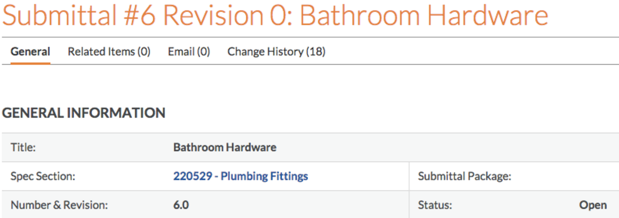Should I enable the Specifications tool on my project?
Background
The Specifications tool is available in Procore's web and mobile applications. The Specifications tool is similar in function to the Drawings tool (see Drawings). Users can upload specifications, view content, track revisions, and perform keyword searches for matching content.
When setting up a project in Procore, you must decide which tool you will use to manage your specification book.
- The Specifications tool is best used for projects with a specification book PDF that will be updated throughout the project with multiple revisions.
- The Specification Section page of the Admin tool is best used for projects without a spec book, or with a spec book that is not expected to change or be referenced by outside parties.
See the table below for a feature comparison.
Answer
Compare the features of each option below to determine which method of managing the project's specifications is right for your project. If your team decides that the Admin Specifications Sections Page is the right option for you, do not turn on the Specifications tool. Instead, learn how you can manage your specification sections in the Admin tool by following this link: Add and Edit Spec Sections.
| Feature | Specifications Tool | Admin Spec Sections Page |
|---|---|---|
| -- | Best used for projects with a spec book PDF | Best used for projects without a spec book PDF |
| Bulk upload specifications (without PDFs) via excel spreadsheet | ||
| Create a specification section "on the fly" from other tools in Procore, like Submittals, RFIs, etc. | ||
| Reference specification section numbers on items in Procore | ||
| Link specification section PDFs to items in Procore and have the PDF viewable from within the item | ||
| Search within the specification book PDF for key words | ||
| Search and filter for specification sections in the Specifications register | ||
| Upload new revisions and reference old revisions of the specification book |
For Projects With Existing Specifications:
If you are going to turn on the Specifications tab for a project in which you have already uploaded specifications through the project Admin tab, or created Submittals, RFIs or other items that have a specification section number associated to the item, please be aware of the following:
- By default, when the Specifications tool is activated, all existing specification sections migrate into the newly activated tool. They are placed into a default Division “100 - Unclassified”. (Before the Specifications tab is turned on, the list lives under the Project Admin tab). These specification sections are usually still linked to items in other Procore tools, like Submittals and RFIs, and therefore cannot be deleted. Specification sections can only be deleted when they are not associated to other items in Procore.
- Before you upload your specification PDF, it is important to edit your existing specifications to match the corresponding specifications in your PDF. Procore uses text extraction to look for matches on your PDF.
- Spaces, dashes and periods are omitted when looking for matches, so 033000 for “Cast-In-Place Concrete” would match with 03-3000 as well as 03-30-00, 03 3000, 03 30 00, etc.
- Once you upload your actual Specifications in PDF format to the newly enabled tool, any new specification numbers that match already existing specification numbers will be merged and the items (RFIs, Submittals, etc.) associated to the specification section will be updated. These items will now contain a link to your actual specification book’s corresponding section to view the specification information.
- After publishing your specifications from the review page, you will see that there is now an “Open” button to view the specification pdf from the list view. You will also be able to view a specification directly from a Submittal or RFI itself, as the Spec number will turn into a clickable hyperlink. See the example below:

Enabling Specifications
If, after reading the article above, you would like to active the tool on your existing projects, consider making the following changes first:
- Update permissions for the Specifications tool on your default permission templates. See Manage Project Permissions Templates.
- Enable the tool on your standard project template so it is on by default for all new projects. See Add or Remove Project Tools.

